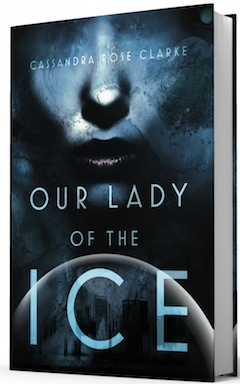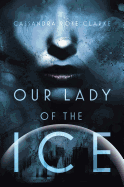Our Lady of the Ice
by Cassandra Rose Clarke
It's Last Night in Hope City, Antarctica. The last night before winter, one more evening of revelry before the citizens batten down for the long, cold night to come. Once an amusement park for world's wealthiest, this Argentinian colony now produces nuclear energy for the mainland. It is protected by a dome that keeps the brutal Antarctic cold at bay and allows its residents to remain there year-round. The nuclear energy they produce is siphoned off to the mainland, while they themselves are forced to rely on outdated steam and coal to power the systems that make life in the dome possible. Winter means a temporary end to mainland supply shipments, a dry spell in an already meager trickle of luxury goods such as coffee, sugar and cigarettes. But on Last Night, the heat is turned up, the lights are left on, and the streets look more like Rio than the South Pole.
Dancing in the thick of the crowd are Diego and Eliana, a typical pair of Hope City natives trying to make the best of their brutal lot. Diego makes his living running errands for Ignacio Cabrera, the city's underworld kingpin. Eliana operates on the other side of the law--just barely. Diego likes to call her a cop, but she's a private detective. Most of her cases involve chasing down philandering husbands or runaway kids. She does her best to stay out of Cabrera's way, sticking to low-profile situations that won't get her noticed by the powers-that-be. Eliana has just one goal: to get out. There's a large Antarctic Independence movement in Hope City, with everyone from radical terrorists to politicians and philanthropists fighting in their own way for self-determination. Eliana is sympathetic, but her heart yearns to experience the life on the mainland, which she only knows from the films and TV shows of her childhood.
Not long after Last Night, a beautiful woman walks into Eliana's dingy office. Her business is delicate, she says, discreet. Like any PI worth her salt, Eliana responds that discretion is her speciality. The beautiful woman also happens to be famous: her name is Marianella Luna and she is a member of the Antarctican aristocracy well known for her support of the independence movement. She's come for help because some documents have been stolen from her home. Eliana takes the job, enticed by the exorbitant paycheck Marianella is offering: anyone can get a mainland visa and a ticket on an icebreaker during the Summer season--anyone who has a few thousand dollars to spare, that is, which Eliana decidedly does not. Of course, the job turns out to be more trouble than she could ever have expected. Eliana retrieves the documents, but manages to get entangled with Ignacio Cabrera in the process. Marianella has secretly built an agricultural dome that threatens Cabrera's monopoly on illicit winter imports. Those documents contain a secret that would spell the end of her project, and Cabrera was the one who had them stolen. He wants Marianella dead, and he goes as far as having his goons throw her out of the City to what should be a certain, quick death from exposure.
Cassandra Clarke's novel has all the markings of a classic noir thriller: gangsters and PIs, corrupt politicians and femmes fatales, yet this is more than Raymond Chandler with a sub-zero setting. Marianella doesn't die when Cabrera throws her out into the cold, because Marianella isn't human. She's a cyborg, a human-machine blend universally regarded as an abomination. Her closest companion is Luciano, an android who poses as her butler but is in fact a friend and confidant. Androids aren't a common sight in Hope City--they were a feature of its amusement park days, and the few who remain live in secret communities amid the abandoned roller-coasters and casinos, hiding from those who would dismantle them for their precious engineering. When Marianella flees there after Cabrera's assassination attempt, she learns that this seclusion is unlikely to be the case for very much longer. The robots are changing, from the simplest maintenance drones to complex humanoids like Luciano. They are evolving sentience and free will far beyond their programming, and they are not happy with the status quo. Their leader is an android named Sofia, once a dancer and comfort girl for amusement park clients, now determined to reclaim Hope City for robots, androids and cyborgs like Marianella.
There is a natural kinship between sci-fi dystopias and noir mysteries. They share a bleak view of human nature--these are tales where evil is chaotic and entropic, a feature of society rather than an aberration. All the characters, human and otherwise, are suffering from broken programming of one kind or another. Eliana feels displaced in the only home she's ever known. Sofia lacks agency over her own body due to the programming that made her a beautiful dancer and a docile lover. Diego is tortured by a feeling of indebtedness to the monstrous Cabrera, and Marianella feels rejected by both the human and android communities. When everyone is at their worst, even the most fallen have a shot at redemption. In Our Lady of the Ice, Cassandra Clarke uses old tropes to their very best effect, showcasing the chilling wisdom of genre fiction at its best. --Emma Page








